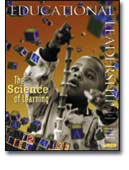Welcome to EL Extra. We have designed questions to help you and your colleagues foster meaningful discussions around this issue of Educational Leadership.
Our questions will not cover all aspects of the issue, but we hope that they will help you generate a conversation around key ideas. Feel free to adapt the questions to be more relevant to your school or school district. Although you can consider many of the questions on your own, we encourage you to use them in pairs, small groups, or even large study groups.
Conversations About the Brain
Read Marcia D'Arcangelo’s interviews with brain experts Andrew Meltzoff (“The Scientist in the Crib,” p. 8) and Steven Petersen (“How Does the Brain Develop?” p. 68).
Meltzoff describes babies and small children as scientists conducting mini-experiments to understand the world around them. To what extent do you find your own students behaving as scientists in the classroom? How do you encourage students to continue developing this experimental and inquisitive mode of learning? What activities have you used to help them hypothesize and test theories and ideas—not just about science but across the curriculum?
Petersen distinguishes between intentional and incidental learning. Talk about those differences in your own words. How do you take advantage of incidental learning in the classroom? When is intentional learning necessary? Give examples.
ADHD
Steven C. Schlozman and Vivien R. Schlozman’s “Chaos in the Classroom: Looking at ADHD” (p. 28) tackles the complex issues of ADHD—what it is, how it is diagnosed and treated, and the ways in which educators can work effectively with students with ADHD.
Discuss your school’s policies and attitudes regarding students with ADHD. For example, how many students with ADHD do you typically have in your classroom each year? Do you talk directly with those students about their diagnoses? Do you work with students or with a school specialist on strategies to improve performance? What kind of professional training does your school or district offer?
Examine the list of strategies for practitioners on (pp.31–33). How might you integrate some of these into your classroom? What other strategies have you found to be effective when working with students with ADHD? How do you balance the needs of individual students with the overall needs of the class?
